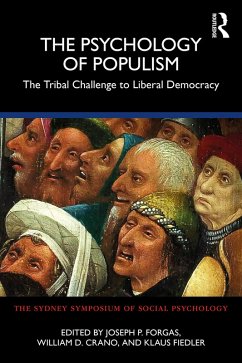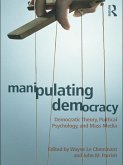The Psychology of Populism (eBook, PDF)
The Tribal Challenge to Liberal Democracy
Redaktion: Forgas, Joseph P.; Fiedler, Klaus; Crano, William D.
44,95 €
44,95 €
inkl. MwSt.
Sofort per Download lieferbar

22 °P sammeln
44,95 €
Als Download kaufen

44,95 €
inkl. MwSt.
Sofort per Download lieferbar

22 °P sammeln
Jetzt verschenken
Alle Infos zum eBook verschenken
44,95 €
inkl. MwSt.
Sofort per Download lieferbar
Alle Infos zum eBook verschenken

22 °P sammeln
The Psychology of Populism (eBook, PDF)
The Tribal Challenge to Liberal Democracy
Redaktion: Forgas, Joseph P.; Fiedler, Klaus; Crano, William D.
- Format: PDF
- Merkliste
- Auf die Merkliste
- Bewerten Bewerten
- Teilen
- Produkt teilen
- Produkterinnerung
- Produkterinnerung

Bitte loggen Sie sich zunächst in Ihr Kundenkonto ein oder registrieren Sie sich bei
bücher.de, um das eBook-Abo tolino select nutzen zu können.
Hier können Sie sich einloggen
Hier können Sie sich einloggen
Sie sind bereits eingeloggt. Klicken Sie auf 2. tolino select Abo, um fortzufahren.

Bitte loggen Sie sich zunächst in Ihr Kundenkonto ein oder registrieren Sie sich bei bücher.de, um das eBook-Abo tolino select nutzen zu können.
The recent rise of populist politics represent a major challenge for liberal democracies. This important book explores the psychological reasons for the rise of populism, featuring contributions from leading international researchers in the fields of psychology and political science.
- Geräte: PC
- ohne Kopierschutz
- eBook Hilfe
- Größe: 3.87MB
Andere Kunden interessierten sich auch für
![The Psychology of Populism (eBook, ePUB) The Psychology of Populism (eBook, ePUB)]() The Psychology of Populism (eBook, ePUB)44,95 €
The Psychology of Populism (eBook, ePUB)44,95 €![The Genetics of Political Behavior (eBook, PDF) The Genetics of Political Behavior (eBook, PDF)]() Michael RyanThe Genetics of Political Behavior (eBook, PDF)44,95 €
Michael RyanThe Genetics of Political Behavior (eBook, PDF)44,95 €![Manipulating Democracy (eBook, PDF) Manipulating Democracy (eBook, PDF)]() Manipulating Democracy (eBook, PDF)41,95 €
Manipulating Democracy (eBook, PDF)41,95 €![Social Psychology of Political Polarization (eBook, PDF) Social Psychology of Political Polarization (eBook, PDF)]() Social Psychology of Political Polarization (eBook, PDF)55,95 €
Social Psychology of Political Polarization (eBook, PDF)55,95 €![Populism and the European Culture Wars (eBook, PDF) Populism and the European Culture Wars (eBook, PDF)]() Frank FurediPopulism and the European Culture Wars (eBook, PDF)37,95 €
Frank FurediPopulism and the European Culture Wars (eBook, PDF)37,95 €![Ethnocentrism (eBook, PDF) Ethnocentrism (eBook, PDF)]() Boris BizumicEthnocentrism (eBook, PDF)40,95 €
Boris BizumicEthnocentrism (eBook, PDF)40,95 €![Political Incivility in the Parliamentary, Electoral and Media Arena (eBook, PDF) Political Incivility in the Parliamentary, Electoral and Media Arena (eBook, PDF)]() Political Incivility in the Parliamentary, Electoral and Media Arena (eBook, PDF)38,95 €
Political Incivility in the Parliamentary, Electoral and Media Arena (eBook, PDF)38,95 €-
-
-
The recent rise of populist politics represent a major challenge for liberal democracies. This important book explores the psychological reasons for the rise of populism, featuring contributions from leading international researchers in the fields of psychology and political science.
Dieser Download kann aus rechtlichen Gründen nur mit Rechnungsadresse in A, B, BG, CY, CZ, D, DK, EW, E, FIN, F, GR, HR, H, IRL, I, LT, L, LR, M, NL, PL, P, R, S, SLO, SK ausgeliefert werden.
Produktdetails
- Produktdetails
- Verlag: Taylor & Francis
- Seitenzahl: 386
- Erscheinungstermin: 18. Februar 2021
- Englisch
- ISBN-13: 9781000368901
- Artikelnr.: 60972023
- Verlag: Taylor & Francis
- Seitenzahl: 386
- Erscheinungstermin: 18. Februar 2021
- Englisch
- ISBN-13: 9781000368901
- Artikelnr.: 60972023
Joseph P. Forgas is Scientia Professor at the University of New South Wales. His research focuses on affective influences on social cognition and behavior. For his work, he received the Order of Australia and the Distinguished Scientific Contribution Award, and he has been elected Fellow of the Australian and Hungarian Academies of Science. William D. Crano is Oskamp professor of Psychology at Claremont Graduate University. He was Liaison Scientist for the US Office of Naval Research, NATO Senior Scientist, and Fulbright Senior Scholar. His research focuses on attitude development and attitude change and their applications. Klaus Fiedler is Professor of Psychology at the University of Heidelberg and Fellow of the German Academies of Science, the Association for Psychological Sciences, and Society for Personality and Social Psychology. His research focuses on social cognition, language, judgments, and decision making. He received several awards, including the Leibniz Award, and he is on the editorial boards of leading journals.
Preface by Joseph P. Forgas
William D. Crano and Klaus Fiedler Chapter 1. The Psychology of Populism: The Tribal Threat to Liberal Democracy. Joseph P. Forgas
University of New South Wales
William Crano
Claremont Graduate University and Klaus Fiedler
University of Heidelberg PART 1. WHAT POPULISTS WANT: MOTIVATIONAL AND EMOTIONAL FACTORS IN POPULISM Chapter 2. Populism and the Social Psychology of Grievance. Peter H. Ditto and Cristian G. Rodriguez
University of California
Irvine. Chapter 3. Socio-psychological Analysis of the Deterioration of Democracy and the Rise of Authoritarianism: The Role of Needs
Values
and Context. Daniel Bar-Tal and Tamir Magal
Tel Aviv University
Israel Chapter 4. Beyond Populism: The Psychology of Status-Seeking and Extreme Political Discontent. Michael Bang Petersen
Mathias Osmundsen & Alexander Bor
Department of Political Science
Aarhus University Chapter 5. The Rise of Populism: The Politics of Justice
Anger
and Grievance. George E. Marcus
Williams College Chapter 6. Collective Narcissism and the Motivational Underpinnings of the Populist Backlash. Agnieszka Golec de Zavala
Dorottya Lantos and Oliver Keenan Goldsmiths
University of London PART 2. THE POPULIST MIND: COGNITIVE ASPECTS OF POPULISM Chapter 7. Psychological Perversities and Populism. Joachim I. Krueger
Brown University
USA and David J. Grüning
University of Mannheim
Germany Chapter 8. Overconfidence in Radical Politics. Jan-Willem van Prooijen
Vrije Universiteit Amsterdam Chapter 9. Why Populism Attracts: On the Allure of Certainty and Dignity. Arie W. Kruglanski
Erica Molinario
university of Maryland
and Gilda Sensales
Sapienza University of Rome. Chapter 10. A Non-Populist Perspective on Populism in Psychological Science. Klaus Fiedler
Heidelberg University. PART 3. THE TRIBAL CALL: SOCIAL IDENTITY AND POPULISM Chapter 11. Self-Uncertainty and Populism: Why we Endorse Populist Ideologies
Identify with Populist Groups
and Support Populist Leaders Michael A. Hogg
Claremont Graduate University
Aarhus University
and Oluf Gøtzsche-Astrup
Aarhus university
Denmak. Chapter 12. When Populism Triumphs: From Democracy to Autocracy. Joseph P. Forgas
University of New South Wales
Sydney and Dorottya Lantos
Goldsmiths
University of London Chapter 13. Populism in Power: The tribal Challenge. Péter Krekó
Eotvos Lorand University of Budapest
and Johns Hopkins University
USA. Chapter 14. The Rise of Populism in the USA: Nationalism
Race
and American Party Politics Leonie Huddy and Alessandro Del Ponte
Stoney Brook University
USA Chapter 15. Threat
Tightness
and the Evolutionary Appeal of Populist Leaders. Michele J. Gelfand and Rebecca Lorente
University of Maryland
College Park
USA. PART 4. POPULIST NARRATIVES AND PROPAGANDA Chapter 16. Social Psychological Contributions to the Study of Populism: Minority Influence and Leadership Processes in the Rise and Fall of Populist Movements William D. Crano
Claremont Graduate University and Amber M. Gaffney
Humboldt State University Chapter 17. Value Framing and Support for Populist Propaganda. Joel Cooper and Joseph Avery
Princeton University Chapter 18. Rapid social change and the emergence of populism. Robin R. Vallacher and Eli Fennell
Florida Atlantic University Chapter 19. Authoritarianism
Education
and Support for Right-Wing Populism. Stanley Feldman
Department of Political Science
Stony Brook University
William D. Crano and Klaus Fiedler Chapter 1. The Psychology of Populism: The Tribal Threat to Liberal Democracy. Joseph P. Forgas
University of New South Wales
William Crano
Claremont Graduate University and Klaus Fiedler
University of Heidelberg PART 1. WHAT POPULISTS WANT: MOTIVATIONAL AND EMOTIONAL FACTORS IN POPULISM Chapter 2. Populism and the Social Psychology of Grievance. Peter H. Ditto and Cristian G. Rodriguez
University of California
Irvine. Chapter 3. Socio-psychological Analysis of the Deterioration of Democracy and the Rise of Authoritarianism: The Role of Needs
Values
and Context. Daniel Bar-Tal and Tamir Magal
Tel Aviv University
Israel Chapter 4. Beyond Populism: The Psychology of Status-Seeking and Extreme Political Discontent. Michael Bang Petersen
Mathias Osmundsen & Alexander Bor
Department of Political Science
Aarhus University Chapter 5. The Rise of Populism: The Politics of Justice
Anger
and Grievance. George E. Marcus
Williams College Chapter 6. Collective Narcissism and the Motivational Underpinnings of the Populist Backlash. Agnieszka Golec de Zavala
Dorottya Lantos and Oliver Keenan Goldsmiths
University of London PART 2. THE POPULIST MIND: COGNITIVE ASPECTS OF POPULISM Chapter 7. Psychological Perversities and Populism. Joachim I. Krueger
Brown University
USA and David J. Grüning
University of Mannheim
Germany Chapter 8. Overconfidence in Radical Politics. Jan-Willem van Prooijen
Vrije Universiteit Amsterdam Chapter 9. Why Populism Attracts: On the Allure of Certainty and Dignity. Arie W. Kruglanski
Erica Molinario
university of Maryland
and Gilda Sensales
Sapienza University of Rome. Chapter 10. A Non-Populist Perspective on Populism in Psychological Science. Klaus Fiedler
Heidelberg University. PART 3. THE TRIBAL CALL: SOCIAL IDENTITY AND POPULISM Chapter 11. Self-Uncertainty and Populism: Why we Endorse Populist Ideologies
Identify with Populist Groups
and Support Populist Leaders Michael A. Hogg
Claremont Graduate University
Aarhus University
and Oluf Gøtzsche-Astrup
Aarhus university
Denmak. Chapter 12. When Populism Triumphs: From Democracy to Autocracy. Joseph P. Forgas
University of New South Wales
Sydney and Dorottya Lantos
Goldsmiths
University of London Chapter 13. Populism in Power: The tribal Challenge. Péter Krekó
Eotvos Lorand University of Budapest
and Johns Hopkins University
USA. Chapter 14. The Rise of Populism in the USA: Nationalism
Race
and American Party Politics Leonie Huddy and Alessandro Del Ponte
Stoney Brook University
USA Chapter 15. Threat
Tightness
and the Evolutionary Appeal of Populist Leaders. Michele J. Gelfand and Rebecca Lorente
University of Maryland
College Park
USA. PART 4. POPULIST NARRATIVES AND PROPAGANDA Chapter 16. Social Psychological Contributions to the Study of Populism: Minority Influence and Leadership Processes in the Rise and Fall of Populist Movements William D. Crano
Claremont Graduate University and Amber M. Gaffney
Humboldt State University Chapter 17. Value Framing and Support for Populist Propaganda. Joel Cooper and Joseph Avery
Princeton University Chapter 18. Rapid social change and the emergence of populism. Robin R. Vallacher and Eli Fennell
Florida Atlantic University Chapter 19. Authoritarianism
Education
and Support for Right-Wing Populism. Stanley Feldman
Department of Political Science
Stony Brook University
Preface by Joseph P. Forgas
William D. Crano and Klaus Fiedler Chapter 1. The Psychology of Populism: The Tribal Threat to Liberal Democracy. Joseph P. Forgas
University of New South Wales
William Crano
Claremont Graduate University and Klaus Fiedler
University of Heidelberg PART 1. WHAT POPULISTS WANT: MOTIVATIONAL AND EMOTIONAL FACTORS IN POPULISM Chapter 2. Populism and the Social Psychology of Grievance. Peter H. Ditto and Cristian G. Rodriguez
University of California
Irvine. Chapter 3. Socio-psychological Analysis of the Deterioration of Democracy and the Rise of Authoritarianism: The Role of Needs
Values
and Context. Daniel Bar-Tal and Tamir Magal
Tel Aviv University
Israel Chapter 4. Beyond Populism: The Psychology of Status-Seeking and Extreme Political Discontent. Michael Bang Petersen
Mathias Osmundsen & Alexander Bor
Department of Political Science
Aarhus University Chapter 5. The Rise of Populism: The Politics of Justice
Anger
and Grievance. George E. Marcus
Williams College Chapter 6. Collective Narcissism and the Motivational Underpinnings of the Populist Backlash. Agnieszka Golec de Zavala
Dorottya Lantos and Oliver Keenan Goldsmiths
University of London PART 2. THE POPULIST MIND: COGNITIVE ASPECTS OF POPULISM Chapter 7. Psychological Perversities and Populism. Joachim I. Krueger
Brown University
USA and David J. Grüning
University of Mannheim
Germany Chapter 8. Overconfidence in Radical Politics. Jan-Willem van Prooijen
Vrije Universiteit Amsterdam Chapter 9. Why Populism Attracts: On the Allure of Certainty and Dignity. Arie W. Kruglanski
Erica Molinario
university of Maryland
and Gilda Sensales
Sapienza University of Rome. Chapter 10. A Non-Populist Perspective on Populism in Psychological Science. Klaus Fiedler
Heidelberg University. PART 3. THE TRIBAL CALL: SOCIAL IDENTITY AND POPULISM Chapter 11. Self-Uncertainty and Populism: Why we Endorse Populist Ideologies
Identify with Populist Groups
and Support Populist Leaders Michael A. Hogg
Claremont Graduate University
Aarhus University
and Oluf Gøtzsche-Astrup
Aarhus university
Denmak. Chapter 12. When Populism Triumphs: From Democracy to Autocracy. Joseph P. Forgas
University of New South Wales
Sydney and Dorottya Lantos
Goldsmiths
University of London Chapter 13. Populism in Power: The tribal Challenge. Péter Krekó
Eotvos Lorand University of Budapest
and Johns Hopkins University
USA. Chapter 14. The Rise of Populism in the USA: Nationalism
Race
and American Party Politics Leonie Huddy and Alessandro Del Ponte
Stoney Brook University
USA Chapter 15. Threat
Tightness
and the Evolutionary Appeal of Populist Leaders. Michele J. Gelfand and Rebecca Lorente
University of Maryland
College Park
USA. PART 4. POPULIST NARRATIVES AND PROPAGANDA Chapter 16. Social Psychological Contributions to the Study of Populism: Minority Influence and Leadership Processes in the Rise and Fall of Populist Movements William D. Crano
Claremont Graduate University and Amber M. Gaffney
Humboldt State University Chapter 17. Value Framing and Support for Populist Propaganda. Joel Cooper and Joseph Avery
Princeton University Chapter 18. Rapid social change and the emergence of populism. Robin R. Vallacher and Eli Fennell
Florida Atlantic University Chapter 19. Authoritarianism
Education
and Support for Right-Wing Populism. Stanley Feldman
Department of Political Science
Stony Brook University
William D. Crano and Klaus Fiedler Chapter 1. The Psychology of Populism: The Tribal Threat to Liberal Democracy. Joseph P. Forgas
University of New South Wales
William Crano
Claremont Graduate University and Klaus Fiedler
University of Heidelberg PART 1. WHAT POPULISTS WANT: MOTIVATIONAL AND EMOTIONAL FACTORS IN POPULISM Chapter 2. Populism and the Social Psychology of Grievance. Peter H. Ditto and Cristian G. Rodriguez
University of California
Irvine. Chapter 3. Socio-psychological Analysis of the Deterioration of Democracy and the Rise of Authoritarianism: The Role of Needs
Values
and Context. Daniel Bar-Tal and Tamir Magal
Tel Aviv University
Israel Chapter 4. Beyond Populism: The Psychology of Status-Seeking and Extreme Political Discontent. Michael Bang Petersen
Mathias Osmundsen & Alexander Bor
Department of Political Science
Aarhus University Chapter 5. The Rise of Populism: The Politics of Justice
Anger
and Grievance. George E. Marcus
Williams College Chapter 6. Collective Narcissism and the Motivational Underpinnings of the Populist Backlash. Agnieszka Golec de Zavala
Dorottya Lantos and Oliver Keenan Goldsmiths
University of London PART 2. THE POPULIST MIND: COGNITIVE ASPECTS OF POPULISM Chapter 7. Psychological Perversities and Populism. Joachim I. Krueger
Brown University
USA and David J. Grüning
University of Mannheim
Germany Chapter 8. Overconfidence in Radical Politics. Jan-Willem van Prooijen
Vrije Universiteit Amsterdam Chapter 9. Why Populism Attracts: On the Allure of Certainty and Dignity. Arie W. Kruglanski
Erica Molinario
university of Maryland
and Gilda Sensales
Sapienza University of Rome. Chapter 10. A Non-Populist Perspective on Populism in Psychological Science. Klaus Fiedler
Heidelberg University. PART 3. THE TRIBAL CALL: SOCIAL IDENTITY AND POPULISM Chapter 11. Self-Uncertainty and Populism: Why we Endorse Populist Ideologies
Identify with Populist Groups
and Support Populist Leaders Michael A. Hogg
Claremont Graduate University
Aarhus University
and Oluf Gøtzsche-Astrup
Aarhus university
Denmak. Chapter 12. When Populism Triumphs: From Democracy to Autocracy. Joseph P. Forgas
University of New South Wales
Sydney and Dorottya Lantos
Goldsmiths
University of London Chapter 13. Populism in Power: The tribal Challenge. Péter Krekó
Eotvos Lorand University of Budapest
and Johns Hopkins University
USA. Chapter 14. The Rise of Populism in the USA: Nationalism
Race
and American Party Politics Leonie Huddy and Alessandro Del Ponte
Stoney Brook University
USA Chapter 15. Threat
Tightness
and the Evolutionary Appeal of Populist Leaders. Michele J. Gelfand and Rebecca Lorente
University of Maryland
College Park
USA. PART 4. POPULIST NARRATIVES AND PROPAGANDA Chapter 16. Social Psychological Contributions to the Study of Populism: Minority Influence and Leadership Processes in the Rise and Fall of Populist Movements William D. Crano
Claremont Graduate University and Amber M. Gaffney
Humboldt State University Chapter 17. Value Framing and Support for Populist Propaganda. Joel Cooper and Joseph Avery
Princeton University Chapter 18. Rapid social change and the emergence of populism. Robin R. Vallacher and Eli Fennell
Florida Atlantic University Chapter 19. Authoritarianism
Education
and Support for Right-Wing Populism. Stanley Feldman
Department of Political Science
Stony Brook University







